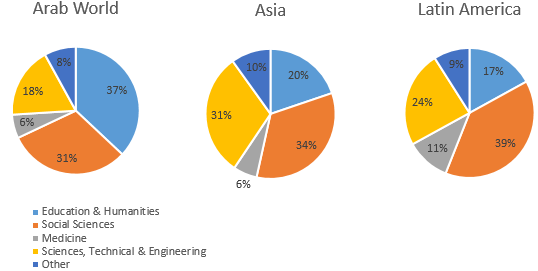View of private sector employers of fresh graduates
According to World Bank survey and interviews with private sectors employers, in their eyes graduates do not generally have the combination of hard and soft skills they are seeking. World Bank’s studies on the Arab world show that only 28% of those surveyed agreed that their university hires were appropriately skilled. As these skills will be of particular importance to the economy in the coming years, this should sound alarm bells about the present quality of post-secondary education and its poor match to employment needs. Overall, World Bank’s survey and interviews with business leaders across the region reveals significant gaps in three key areas:
• Hard skills: employers say that graduates often lack an adequate understanding of both the theory and application of the discipline in which they have graduated. An executive from Algeria is typical in stating, “Even engineers do not have the practical technical knowledge to enter firms... people graduating from schools are not well-versed with updated technologies.”
• Soft skills: employers say they value soft skills – such as the ability to communicate clearly, personal creativity, problem-solving skills, and the interpersonal skills necessary to interact successfully in the workplace –but complain that there is too little emphasis on these aspects in the present curricula of most post-secondary education programs. For example, a managing director in Saudi Arabia told us, “Students are graduating with severe deficits in soft skills such as leadership, critical thinking, initiative taking, independence, oral communication, and work ethics.”
• Language skills: are also highly valued by employers. English is prevalent in many businesses in the Arab World and employers believe that graduates need to be proficient in English in order to succeed in the workplace. However, many are far from proficient because English language teaching is inadequate in the majority of educational programs.
You can find the list of skills needed for each career path on Tumoohi under this link: http://www.tumoohi.org/en/job-profiles
Employers told World Bank they believe there are two main reasons for these skills gaps. The first is that too many students are making the wrong choices in the courses they take. The second is that the course content does not keep pace with changes in the business world.
Employers say that the present inappropriate course mix is failing to serve the needs of the Arab economies. The mix is inappropriate both in terms of the balance between Vocational ET courses and university courses, and in terms of the overall mix of universities graduates.
As a result of the shortage of VET trained employees, employers frequently complain about the shortage of professionals in the trades: “Today it is difficult to find an electrician or a carpenter.” Inevitably, this has implications for the labor market: an IT industry CEO in Algeria commented, “The lack of qualified technicians is more severe than the lack of engineers... we pay some of our technicians more than the engineers.” Such shortages are widespread, as the demand for vocational skills in the services sector, in areas such as IT, tourism, and health care, is growing both in the region and globally.
Further, the study informs that too large a number of students pursue courses in social sciences and the arts, and that these students graduate with little or no knowledge relevant to the workplace, while insufficient numbers study the professions or applied sciences. The skew towards education and the humanities is certainly greater in the region than in much of Asia or Latin America (Image attached). Several interviewees point to the fact that while this mix might have been appropriate historically for securing employment within the public sector, it is no longer appropriate to today’s needs. They believe this situation can and must change. The second reason for the present skills gap is failure to keep up with the pace of, change in the business world, which was highlighted by many employers. For instance, one business leader from Algeria stated, “While the job market is creating new needs... the university offer has not shifted its offer to these new needs.” Other stakeholders also echo this sentiment: students, government leaders, and education providers all told us that there is a need for greater responsiveness in the education system to changing circumstances and that there should be increased communication between employers and educationalists. When probed about why communication was currently so weak, we were told, “The market and academia never talk and have no idea what the other is doing... we speak a different language.”
You can find a list of university programs on Tumoohi under this link: http://www.tumoohi.org/en/search
#education_for_employment
Sources: World bank, International Finance Corporation

